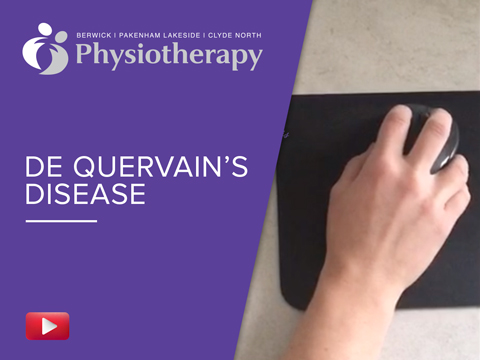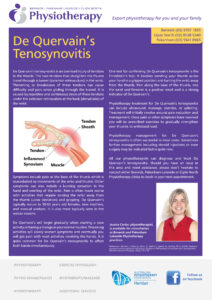What is De Quervain’s disease? This is a type of tenosynovitis in the wrist which is very common.
De Quervain’s tenosynovitis is an overload injury of tendons in the thumb. The two tendons that straighten the thumb travel through a tunnel (extensor retinaculum) in the wrist. Thickening or breakdown of these tendons can cause difficulty and pain when gliding through the tunnel. It is caused by repetitive and continuous strain of these tendons under the extensor retinaculum at the back (dorsal side) of the wrist.
Symptoms include pain at the base of the thumb which is exacerbated by movements of the wrist and thumb. Other symptoms can also include a burning sensation in the hand and swelling of the wrist. Pain is often made worse with activities that require turning the wrist away from the thumb (ulnar deviation) and gripping. De Quervain’s typically occurs in 30-50 years old females, new mothers, and manual workers. It is also more typically seen in the winter months.
De Quervain’s will begin gradually when starting a new activity or having a change in your normal routine. Provoking activities will slowly worsen symptoms and eventually you will get pain with most activities involving the hands. It is quite common for De Quervain’s tenosynovitis to affect both hands simultaneously.
One test for confirming De Quervain’s tenosynovitis is the Finkelstein’s test. It involves bending your thumb across your hand in a gripped position and turning the wrist away from the thumb. Pain along the base of the thumb, into the wrist and forearm is a positive result and is a strong indicator of De Quervain’s.
Physiotherapy treatment for De Quervain’s tenosynovitis can include ultrasound, massage, exercise, or splinting. Treatment will initially revolve around pain reduction and management. Once pain or other symptoms have resolved you will be prescribed exercises to gradually strengthen your thumbs to withstand load.
Physiotherapy management for De Quervain’s tenosynovitis is often successful in most cases. Sometimes further management including steroid injections or even surgery may be indicated but is quite rare.
All our physiotherapists can diagnose and treat De Quervain’s tenosynovitis. Should you have an issue in this area and need assistance, please don’t hesitate to contact either Berwick, Pakenham Lakeside or Clyde North Physiotherapy clinics to book in your next appointment.


